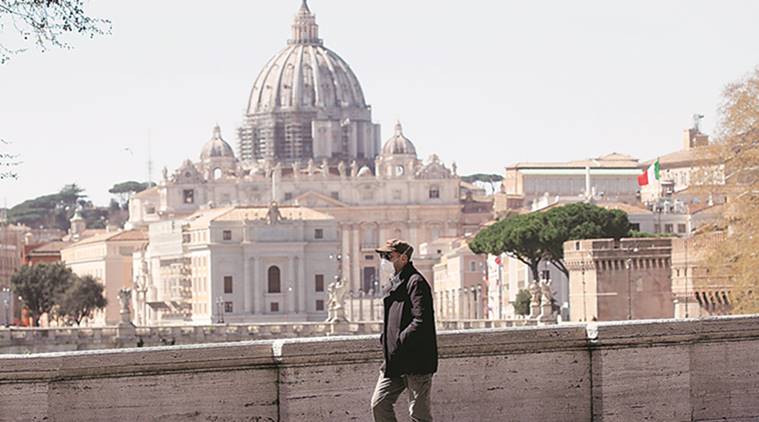 A man takes a stroll amid the coronavirus lockdown in Italy. (Source: Reuters)
A man takes a stroll amid the coronavirus lockdown in Italy. (Source: Reuters)
For the first time in a century, the human race faces an existential question: who will live to see 2021, and who will die? In the abstract, it is an academic question since the death rate will be low. But it is engrossing because the absolute numbers will be very large, and everyone secretly wonders if they or their family and friends will become pandemic statistics.
In that century since the influenza pandemic, speculative fiction and futurology emerged as independent genre and respectable discipline, serving up the fruits of human folly with relish. In the free world, World War II anxiety was followed by unprecedented prosperity and public safety. Stories of vicarious suffering, dystopias and disaster porn rushed in to fill the void.
Broadly speaking, this literature depicted the failure of humanity to protect itself from superior intelligence and from the products of its own reckless intelligence (AI in The Terminator and ecological and social/environmental disaster in Mad Max: Fury Road). Very few anticipated a superbug capable of popping the existential question. Now that the real thing is here, perhaps vicarious suffering will languish for a while. NK Jemesin’s The City We Became, which is just out and depicts a crisis heightened by human prejudices, could be the last of the current crop. One looks forward to a boom in humour and satire.
Apart from content, form, packaging and delivery are also liable to change. Our lives have already been altered by disruptive startups, which offer new ways to consume a range of cultural products, from food to media and education. Some, which depend on physical delivery, will falter during lockdowns, bringing back long-forgotten memories of socialist scarcity.
Others are making the lockdown tolerable. Imagine house arrest for the same class without streaming music and video, without cookery sites, wellness apps and social media. Old habits die hard, but alternative modes of delivery could accelerate their demise. In music, the world had already migrated from personal collections to streaming services. The weekend outing to the multiplex is still a habit, but the ease with which streaming video can be accessed in the cities is seductive. On the other hand, the world has resolutely stayed with the printed book, and, in our region, the morning newspaper remains a habit.
But habits are eventually fragile, and curling up with a cup of tea and the mobile phone is an equally compelling habit – especially so if the consumer is not very literate and more comfortable with audio or video news. The world is already divided according to the mode of delivery it accesses – in the US, there is the Breitbart reader and the New York Times reader, consuming conspiracy theory and reported fact respectively. Now, if serious media houses commit more forcefully to digital delivery, as the NYT has done, that divide could shrink.
This business opportunity could also be politically profitable. The recent social and political polarisation in the biggest democracies is comparable with the devastating schisms of the age when religion defined politics. Stress brings out the worst in people, and the novel coronavirus will be with us long enough to do serious psychological damage. Under stress, people seek scapegoats.
In Europe, from the 15th century, the scapegoat was the Jew. In the plague years, the community was massacred in Barcelona, Toulon, Frankfurt, Mainz, Cologne, Basel on the perception that they were relatively immune – possibly because they lived in cleaner conditions. That forced a migration of Jews to eastern Europe, where the pogrom was completed six centuries later by the Holocaust. The geopolitical result was the founding of Israel.
Now, in parts of Asia, Muslims are being marginalised, vilified, re-educated or dealt with differentially. The case of the Tablighi Jamaat meet in Delhi, which became an epicentre of the spread of COVID-19, displays the differential. The organisation was in error on several counts, the most grievous being its persistence in the face of restrictions on public gatherings imposed by the state government. It is generally agreed, and rightly so, that its leadership should be prosecuted for accelerating a threat to public health.
But the fact that it was an administrative failure didn’t attract half as much attention – the meet was in the vicinity of an important police station, which should have enforced the law banning gatherings. Such differentials are early warning signs. The historians and political analysts of the distant future may look back on our foreseeable future like we look back on the Holocaust, and prescribe the very same nostrum: “Never again.”